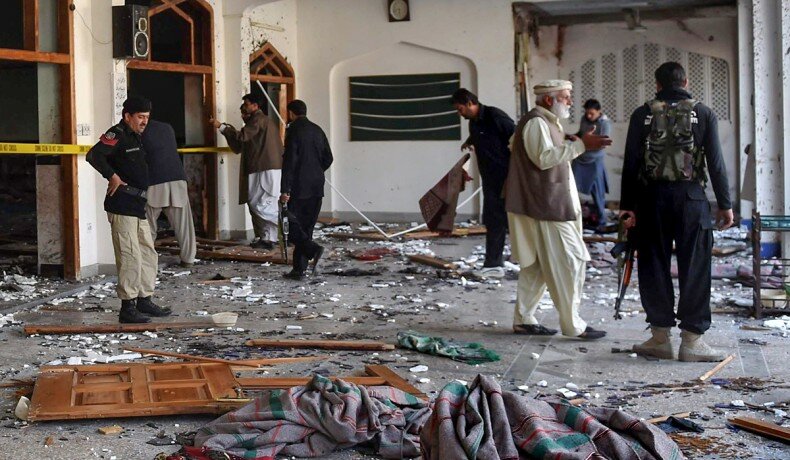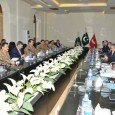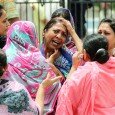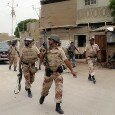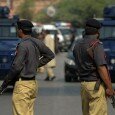By Aoun Sahi –
While Shia community faces bloody backlash of military offensives against terrorists, the government lacks strategy to counter the menace of sectarianism
The backlash of National Action Plan against terrorists in the wake of Peshawar School attack and military operations Zarb-e-Azb in North Waziristan Agency and Khyber-1 in the Khyber Agency seems to have shifted to the Shia community in the country.
In the first two months of 2015, at least 100 Shia killed and scores injured in four major attacks including incident of bombing in a Shia mosque in Shikarpur in Sindh province killing 70 worshippers. According to Majlis-e-Wahdat-ul-Muslimeen (MWM), an organistaion working for Shia rights in Pakistan at least 311 Shias murders in target killing incidents in the country in 2014 including 141 killings in Karachi, 51 in Quetta and 24 in Peshawar.
According to a Middle East Institute (MEI) report, published in December 2014, approximately 3,800 people have died in Pakistan including the tribal area of the Kurram Agency since 2007 in sectarian violence.
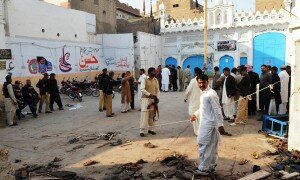 The major groups active in targeting Shias are Lashkar-e-Jhangvi (LeJ), Jundullah and some factions of the Tehreek-e Taliban Pakistan (TTP). Some of these militant groups may focus on killing Shias, while others may focus on targeting the Pakistani state. Shias are easy targets for the TTP. If they cannot target the security forces, Shias are the next best target for them. LeJ, Jundullah and factions of TTP also believe Shias are ‘infidels’ worthy of being killed. They also amplify Shia influence in Pakistani army and government and term them pro-Shia.
The major groups active in targeting Shias are Lashkar-e-Jhangvi (LeJ), Jundullah and some factions of the Tehreek-e Taliban Pakistan (TTP). Some of these militant groups may focus on killing Shias, while others may focus on targeting the Pakistani state. Shias are easy targets for the TTP. If they cannot target the security forces, Shias are the next best target for them. LeJ, Jundullah and factions of TTP also believe Shias are ‘infidels’ worthy of being killed. They also amplify Shia influence in Pakistani army and government and term them pro-Shia.
Experts said when other important targets like security forces were hard to target most of the Deobandi militant groups based in mainland Pakistan attacked Shia. “This is true that Shias are soft target for the militants but it is also about specialization. The militant organizations react to operation against them through their affiliates based at mainland Pakistan. They are mainly sectarian groups. They have their networking and activists all over the country and they are specialized to attack Shias,” said Amir Rana, Islamabad based security expert and director of Pakistan Institute of Peace Studies (PIPS).
“These groups are dependent on bigger groups like TTP and Al Qaeda, but this is also true that these sectarian groups are getting stronger,” Mr Rana said adding that (anti-Shia) rhetoric and activities of ISIS also inspired militants in Pakistan to indulge more in sectarian violence. “There are reports that several militants from Pakistan have also joined militant groups fighting in Syria and Iraq. This provides more inspiration to sectarian groups based at Pakistan.”
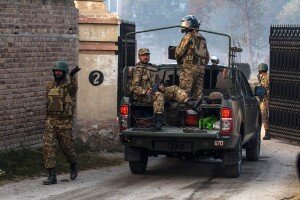 The Pakistani government has largely failed to control the violence against Shias. The government, so far, has also failed to control hate speech against the sect as only a few days earlier ASWJ patron in Chief Ahmed Ludhyanvi declared Shias as infidels in his interview aired by a private TV channel. Experts said that hate speech against Shia Muslims had been creating impacts on the society as well.
The Pakistani government has largely failed to control the violence against Shias. The government, so far, has also failed to control hate speech against the sect as only a few days earlier ASWJ patron in Chief Ahmed Ludhyanvi declared Shias as infidels in his interview aired by a private TV channel. Experts said that hate speech against Shia Muslims had been creating impacts on the society as well.
“Society first used to condemn attacks against Shias but slowly it became indifferent because of propaganda of such people. But, recently the worst has happened as society at large has started accepting the use of violence as just,” said Dr Shahjahan Syed, a Peshawar based educationist and intellectual. “I have not seen people in Peshawar coming out in support of Shias after the latest attack on an Imambargagh in Hayatabad area.” He said that Shias are definitely soft targets. “But the groups like LeJ carry on these attacks also to please their mentor – Saudi Arabia.” He said that the government of Pakistan also had not taken violence against Shias seriously. “Look, the way interior minister Ch Nisar Ali justified government’s reluctance to arrest Mulana Abdul Aziz of Lal Masjid saying it would divert attention of government from ongoing operation against militants. It means the government is afraid of one Mulla but not afraid of a community- Shia. This government definitely has a soft corner for militants.”
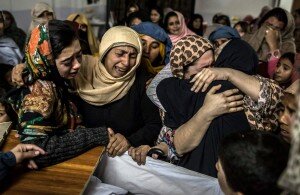 The interior ministry also issued a letter to all provinces in the last week of February saying that LeJ had sought help from Al-Qaeda but upon refusal it had formed a nexus with TTP. The letter read that LeJ militants, in an attempt to free their organisation’s prisoners, might possibly hold ordinary people hostage. The letter also mentioned that following a crackdown by security forces and law enforcement agencies against the organisation, the workers had sought help from Al-Qaeda.
The interior ministry also issued a letter to all provinces in the last week of February saying that LeJ had sought help from Al-Qaeda but upon refusal it had formed a nexus with TTP. The letter read that LeJ militants, in an attempt to free their organisation’s prisoners, might possibly hold ordinary people hostage. The letter also mentioned that following a crackdown by security forces and law enforcement agencies against the organisation, the workers had sought help from Al-Qaeda.
However, Al-Qaeda refused to help LeJ due to its engagement in Iraq and Syria. The letter said that after Al-Qaeda’s refusal, TTP leader Mullah Fazlullah contacted the organization and not only provided financial support to LeJ but also promised to lend more support. The letter also stated that the purpose of targeting Shias in the country is to pressurise the government to halt executions of convicts belonging to terrorist organisations.
Pakistan lifted the moratorium on death penalty in the country after the attack on Peshawar’s Army Public school in December 2014. So far 22 terrorists have been executed, including a number of LeJ workers. The organization is also under pressure and trying all its options to halt executions of its activists in the jails.
The experts on militancy said that over the years the people with strong sectarian credentials had become decisions makers even among the militant groups based at tribal areas of Pakistan. “The current head of TTP Mulla Fazllulah draws his strength from young Urdu speaking and Punjabi Taliban and Darra Adamkhel based militants who had close links with LeJ and SSP,” said Mushtaq Yusufzai, Peshawar based senior journalist who has been covering militancy and militant groups since over a decade.
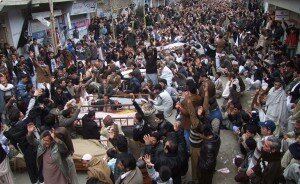 “This new leadership of militant organizations is totally different from old guards. They are ruthless and lethal. Majority of them joined militancy after getting brainwashed by LeJ and SSP ideology. The first generation leadership of TTP like Baitullah Mehsud had least interest in sectarian violence but this new lot has also radaclised tribal militants on sectarian grounds. They do not hesitate using violence to hurt their opponents whether it is security forces or Shias. ISIS though follows hardcore Salfi ideology which militant groups in Pakistan who mostly follow Deobandi Islam do not approve at all. But majority of militants in Pakistan who joined ISIS are either from LeJ or SSP. This mainly is because of ISIS’s stance against Shias,” he said.
“This new leadership of militant organizations is totally different from old guards. They are ruthless and lethal. Majority of them joined militancy after getting brainwashed by LeJ and SSP ideology. The first generation leadership of TTP like Baitullah Mehsud had least interest in sectarian violence but this new lot has also radaclised tribal militants on sectarian grounds. They do not hesitate using violence to hurt their opponents whether it is security forces or Shias. ISIS though follows hardcore Salfi ideology which militant groups in Pakistan who mostly follow Deobandi Islam do not approve at all. But majority of militants in Pakistan who joined ISIS are either from LeJ or SSP. This mainly is because of ISIS’s stance against Shias,” he said.
The writer is a senior journalist based in Lahore





















































































